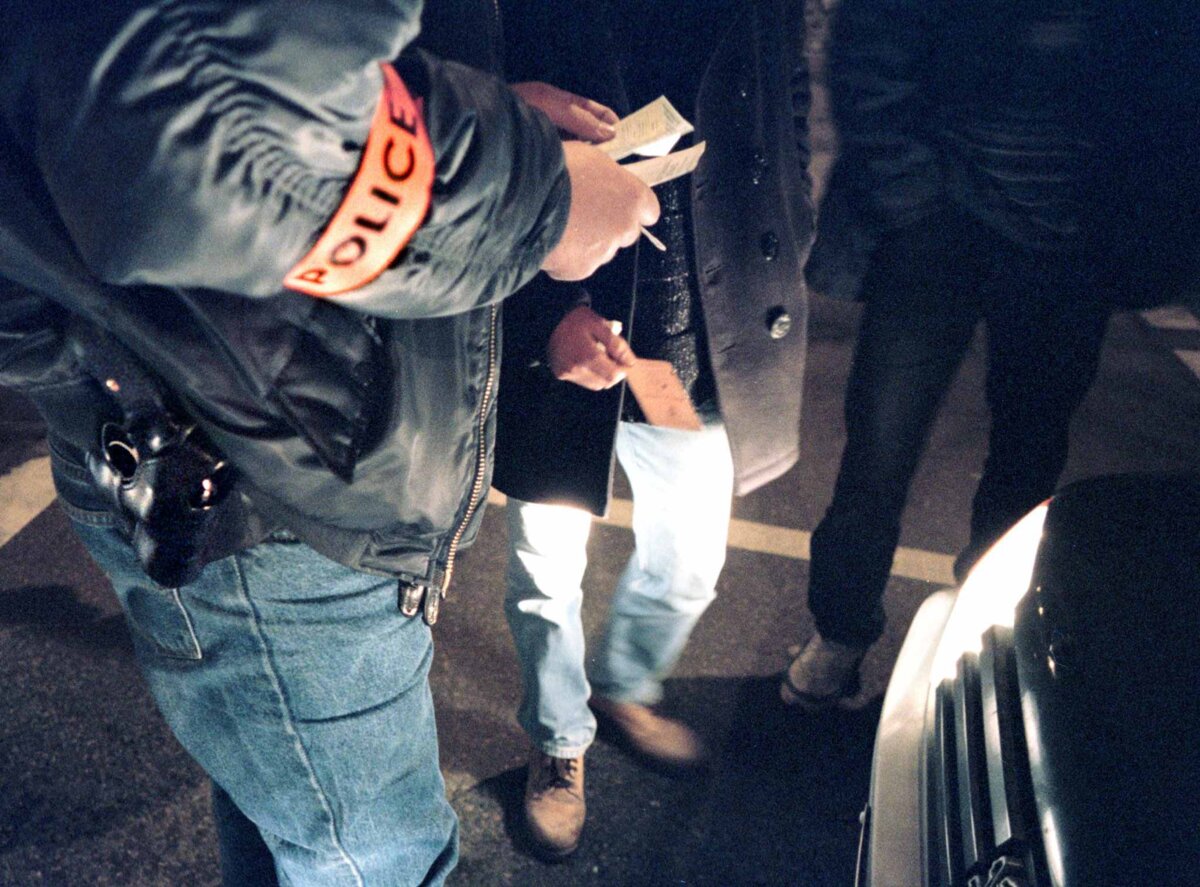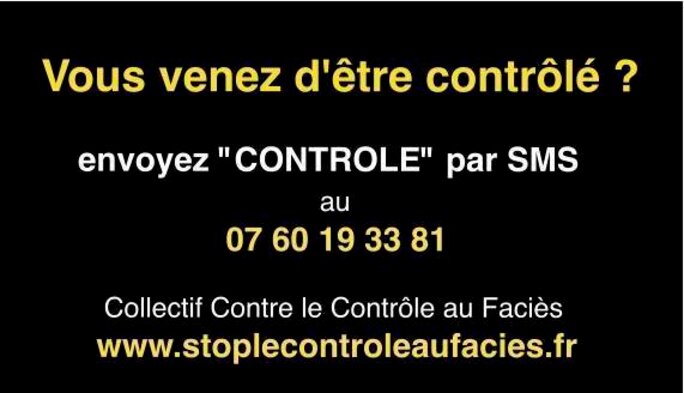In what could become a judicial landmark in France, a group of 15 Black French citizens and others of Arab-origin, aged between 16 and 47, this week filed a lawsuit against the French State for having been subjected to racial profiling by police.
They are demanding that the French Ministry of the Interior prove that the identity checks to which they were subjected by police have a legal basis and are not founded on the colour of their skin.
The move targets what many among France’s population of foreign ethnic origin, notably West African and North African, have for decades denounced as prejudiced harassment by police who in France are empowered to check a person’s identity without justification of any specific suspicion of criminal wrongdoing.
"It is the same principle as freedom of movement,” said lawyer Slim Ben Achour, who filed the suit on April 11th with his colleague Félix de Belloy. “When a person is arrested, they have the right to know why. From a legal stand point, most of the identity checks do not lead to further action. However, for people checked in full sight of everyone, often accompanied by a pat-down as well as by hurtful comments from police officers, it is a violation of their dignity," said Ben Achour.
The practice of racial profiling is described in France as a contrôle d’identité au faciès - meaning an identity check prompted by nothing other than a person’s physical features.

Enlargement : Illustration 1

The plaintiffs cite identity checks as soon as they reach the city centre from their outlying neighbourhoods, at the local McDonald's before an evening out, coming out of a Metro station, or simply walking in their own neighbourhoods. Most talk about the "humiliation" of repeated identity checks, up to "ten times per month" for one 19 year-old youth from Lyon.
The suit, unprecedented in France, is brought by the French lawyers’ union, the SAF, The French branch of the Open Society Justice Initiative - the foundation set-up by US-based billionaire George Soros - and a recently-created French association, the Collective Against Racial Profiling (Collectif contre le contrôle au faciès). The Collective, through a nationwide network, was responsible for gathering the cases.
"The idea is to use the law in a strategic manner on issues in which traditional demonstrations and activism have failed," explains Lanna Hollo, a representative of the Paris office of the Open Society.
In 2009, a study by the French National Centre for Scientific Research, the CNRS, entitled 'Police and Visible Minorities' ('Police et minorités visibles'), demonstrated that among five geographical locations studied in Paris, Blacks were, depending on the site, 7, 8 or 6 times more likely to be stopped and checked than Whites. "This study was the first to prove statistically that the identity checks are not neutral, that discriminatory mechanisms are at work," says lawyer Ben Achour. "We have a scientific basis allowing us to say that racial profiling is not a figment of the imagination."
But, three years later, the authorities still ignore the problem. On January 31st 2012, in a speech before the principal French police officers’ union, interior minister Claude Guéant, who was formerly the head of the national police force, described a recent critical report by Human Rights Watch on racial profiling in France, 'The Root of Humiliation', as "injurious prejudice". Sweeping away criticism, he added: "I am familiar with the ethics of police officers. They have the values of the [French] Republic anchored inside them."
It was in reaction to this continued intransigence that the lawsuit was launched. "It is more promising than filing a complaint against the police in criminal court, because then the authorities cannot get out of it by responding 'Bad luck, you landed on a black sheep'," said Ben Achour. "Catching a couple of racist police officers does not interest us. The summonses are aimed at attacking the core of racial profiling, namely the Ministry of the Interior which is responsible for law enforcement and must be confronted to the strictures of the rule of law."
An identity check is the only police procedure that, in itself, carries no written record. "When there is no further action, there is no trace of the identity check, therefore it is very difficult, if not impossible, to go contest the check in the courts, in spite of this being a fundamental right," complained Open Society’s Lanna Hollo.
To bypass this obstacle, the lawyers collected sworn witness statements by those present during the checks. The lawsuit is also based on the numerous reports by human rights organisations, by international bodies such as the European Commission Against Racism and Intolerance, as well as by national organisations like the French National Committee for Security Ethics (CNDS) which noted "the undeniable reality of racial profiling in France."
A hotline for victims of abuse
In cases of alleged discrimination, European law provides a burden of proof that is favourable to the victim; he or she has to provide evidence indicating that discrimination has occurred, and it is for the defence to prove that its decisions were not motivated by discrimination. "It will be up to the Ministry of the Interior to justify that each identity check had clear grounds, for example because a burglary had just occurred and the person checked corresponded with the thief's profile," explains Ben Achour.
Questioned by the lawyers on the motivations for each of the 15 identity checks submitted in the brief, the interior ministry responded by post in mid-March 2012 with a notification that the general directorate of the national police force had been given charge of making an "appropriate study" of the "request".

In collecting evidence for the lawsuit, the Collective Against Racial Profiling carried out extensive research and in the spring of 2011established a hotline for those who considered themselves victims of racially-motivated identity checks.
Callers to the hotline are given a recorded message advising: "You've reached the phone answering service of the Collective Against Racial Profiling. After all unmotivated identity checks, excluding motor vehicle monitoring, note the date,, the time, the location, people who were with you or the presence of nearby [CCTV] cameras, the motive invoked and the manner in which the identity check was carried out as well as the end result and send 'check' by text message. You will be called back within 24 hours."
Since the hotline was launched, the Collective has received 500 text messages to report identity checks described as unmotivated, perceived as abusive or accompanied by police brutality.
A video series, in which sports figures, actors, comics and musicians testify about the first time they were submitted to a police control of their identity (see immediately below) has contributed to publicising the hotline on the internet.
"That's when you realise that there is a genuine expectation and a feeling of injustice among citizens who do not know who to turn to," said a coordinator for the Collective, who asked not to be named. "The youngest was a little boy of 11 in [the Paris district with a high foreign ethnic population of] Belleville. We have also had mothers calling for their sons aged 12. When you are dealing with children, they don't always understand, especially if the police officers are in plainclothes. They think they are going to be kidnapped."
Depending on the case, the Collective sends those persons interested in taking the issue further either to the lawyers working on abusive identity checks or towards criminal trial lawyers if there are allegations of police brutality. "We also engage in civic education on what is legal or not," the coordinator added. "That reminds youths that the police are doing their job and that if they see a dozen youths in a lobby at 11pm, they can legitimately ask some questions."
The first 15 summonses were filed with the paymaster general, who will pay out unspecified damages if the cases are successful. They were also symbolically deposited in front of the central Paris courthouse buildings on April 11th. "Other people will join us as soon as they are aware of the procedure and have the courage to overcome their fears," predicted Ben Achour.
Last year, an association of about 50 lawyers attempted a different tactic against racial profiling by filing priority questions of constitutionality, known as QPCs (1), with each case presented to the courts of the Greater Paris Region, Lyon, and Lille. This attacked the law itself rather than police practices.
The lawyers involved complain that the definition of the legal stipulations for identity checks under Article 78-2 of French criminal law is so vague that it allows the potential for abuse.
The appeals court, however, refused to transmit the priority questions of constitutionality on to the Constitutional Court. "We are waiting for a new case in which the identity check is exclusively based on racial profiling," says lawyer Joseph Breham, a member of the lawyers' group. "For example, I had a case in which the law enforcement officers write 'Notice three people of North African origin, sitting at the terrace of a café, passing a bag around. Therefore, decide to check identities'. It is clear that the only reason that motivated the police officers to check these people is the fact that they were North African. That is not a ‘plausible reason’ as set-out by the law," he says.
To combat these abuses, several organisations suggest that a police statement be issued for each identity check – a method that has proved productive in Spain – along with a stricter legal framework for the checks.
By filing the suit during the presidential election campaign, its instigators hope that candidates will take a stand on the issue. Their hopes lie notably with Socialist Party candidate, François Hollande, who has promised, if elected, to issue what he called a "circular on the combat against racial profiling during identity controls", but who has offered no further detail of what it would contain.
-------------------------
1: A 'priority question of constitutionality', or questions prioritaires de constitutionnalité, is the right recognised for any person involved in a lawsuit or a legal procedure to argue that legislation infringes on the rights and freedoms guaranteed by the constitution. The appeals court and the Council of State are empowered to ask the Constitutional Court to decide, if need be, to repeal the legislation in question.
English version: Patricia Brett
(Editing by Graham Tearse)


